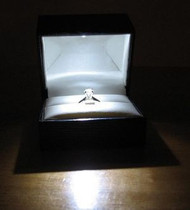Being a modern consumer means not knowing firsthand where exactly all of your purchases come from and in what condition they were produced. Do you know the farmer who grew your sweet potatoes? Do you know exactly where your gas comes from?
Have you been to the country where your running shoes were manufactured? What about the real diamond cluster ring you hope to purchase as an engagement ring? When it comes to diamonds, your assurance as a consumer comes from the Kimberley Process.
Slightly more than a decade old, the Kimberley Process is an international diamond certification scheme that is intended to reassure consumers that the diamonds they are purchasing were mined and sold under fair conditions and that the proceeds from these jewels that symbolize eternal love are not being used to fund things such as armed conflicts.
The Kimberley Process is certainly reassuring, but it is not without its problems. There are difficulties inherent to regulating and monitoring the diamond trade, especially in areas experiencing civil unrest. This is why many different groups are involved in keeping tabs on the diamond trade under the auspices of the Kimberley Process, specifically in regions of the world undergoing political turmoil.
In early December 2011, one of the watchdog groups, Global Witness, dropped out of the Kimberley Process, voicing their disagreement about certain diamonds of questionable origins being released into the world market from Zimbabwe.
Despite this action, the United Nations supported the Kimberley Process Certification Scheme in a December 20, 2011, press release, and they promised global diamond consumers that they will help further strengthen the system. As a consumer, you are not likely to travel to Africa, where a large percentage of the world's diamonds are mined, and you are not likely to have the ability to personally check up on diamond mines.
Instead, you rely on the Kimberley Process to ensure that the diamond cluster ring you have your heart set on is in fact made from conflict-free diamonds. How can you do this?
1. Only purchase wedding jewelry from a jeweler who can guarantee that your ring of choice is in accordance with Kimberley Process regulations, meaning that to the best of their knowledge, it is made from conflict-free diamonds.
My Trio Rings is dedicated to providing consumers with diamonds that are certified conflict-free, as regulated by the United Nations and the Kimberley Process Certification Scheme. In fact, our organization is one of the 72 companies in the world that has the ability to buy diamonds from De Beers. Since we only use diamonds that were bought from the De Beers mines and were cut in our factories, we are able to guarantee that all the diamonds are Kimberly-certified.
2. Compose emails, write letters, or make phone calls to your state and national representatives, asking them to support the United Nations promise to strengthen the Kimberley Process. Your input can further ensure that American consumers are able to continue to purchase certified conflict-free diamonds with confidence.
Photo credit: base2wave



